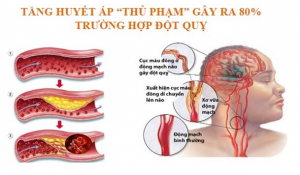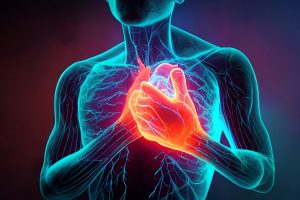Stroke, also known as cerebrovascular accident, is a serious medical condition that occurs when blood flow to a part of the brain is interrupted or reduced, causing the brain to be deprived of oxygen and nutrients. This leads to brain cells beginning to die within minutes. Stroke can cause severe complications and even death if not treated promptly. Below are some major causes that lead to a higher risk of stroke:

Nội dung bài viết
Hypertension – The Leading Cause of Stroke
High blood pressure (hypertension) is one of the leading causes of stroke and is considered a “silent killer” because it often has no clear symptoms. When blood pressure is high, the pressure on the walls of blood vessels also increases, making them more susceptible to damage. Over time, this pressure can make brain blood vessels weak and prone to rupture, leading to a hemorrhagic stroke. Additionally, high blood pressure can cause brain blood vessels to harden and narrow, increasing the risk of blockage, leading to an ischemic stroke. Managing blood pressure through a healthy diet, reducing salt intake, regular exercise, and adhering to medical treatment is crucial to reduce the risk of stroke.

Heart Disease
Cardiovascular diseases such as coronary artery disease, heart failure, and myocardial infarction are major risk factors for stroke. People with heart disease often have a higher risk of forming blood clots due to irregular blood flow, which can block brain blood vessels. Particularly, atrial fibrillation – a common heart rhythm disorder – can cause blood clots to form in the heart. These clots can travel to the brain and block brain blood vessels, leading to a stroke. Managing heart conditions through medication, maintaining a healthy diet, and regular health check-ups are essential to reduce stroke risk.

Diabetes
Diabetes not only causes severe complications for the heart and kidneys but also increases the risk of stroke. Prolonged high blood sugar can damage blood vessels and nerves, increasing the risk of plaque formation and blood clots. When these plaques block brain blood vessels, a stroke can occur. Additionally, diabetes often accompanies other risk factors such as high blood pressure and high cholesterol, forming a dangerous “combo” for vascular and brain health. Managing diabetes through blood sugar control, maintaining a healthy weight, and adhering to medical treatment effectively reduces the risk of stroke.

Smoking
Smoking is one of the leading causes of many dangerous diseases, including stroke. Chemicals in tobacco can cause severe damage to blood vessels, making them harden and narrow, increasing the risk of blockage. Moreover, smoking increases the likelihood of blood clot formation, which can block brain blood vessels. The risk of stroke is significantly higher in smokers compared to non-smokers. Therefore, quitting smoking is one of the most important steps to reduce stroke risk, improve overall health, and prolong life.
Obesity and Sedentary Lifestyle
Obesity and a sedentary lifestyle are major risk factors that contribute to an increased risk of stroke. Overweight and obesity are often associated with other health issues such as high blood pressure, diabetes, and heart disease, all of which increase the risk of stroke. A sedentary lifestyle not only leads to overweight but also reduces blood circulation and cardiovascular function, increasing the risk of blood clot formation. To reduce stroke risk, maintain an active lifestyle with regular exercise, at least 30 minutes a day, combined with a healthy diet rich in fiber, low in saturated fats, and sugars.

Unhealthy Diet
Diet plays a crucial role in stroke prevention. A diet high in saturated fats, cholesterol, and salt can increase the risk of atherosclerosis and high blood pressure, two major risk factors for stroke. Consuming processed foods, low in fruits and vegetables, and whole grains can also lead to weight gain and obesity, thereby increasing stroke risk. To protect health, build a balanced diet with plenty of fruits and vegetables, whole grains, and healthy protein sources like fish and poultry, while limiting foods high in sugar, salt, and unhealthy fats.
Family History and Age
Family history and age are unchangeable risk factors but play a significant role in determining a person’s stroke risk. If there are family members who have had a stroke or cardiovascular diseases, your risk of stroke is higher. Age is also an important factor: the risk of stroke increases with age, especially after 55. Although these factors cannot be changed, understanding and being aware of them can help you proactively manage other risk factors and take appropriate preventive measures.
Alcohol and Drug Use
Alcohol and drug use, particularly cocaine and methamphetamine, can increase the risk of stroke. Excessive alcohol consumption causes many health problems, including high blood pressure, heart rhythm disorders, and blood vessel damage. Stimulants like cocaine and methamphetamine can cause severe blood vessel constriction, increasing the risk of brain hemorrhage and blood vessel blockage. To reduce stroke risk, moderate alcohol consumption and avoiding drugs are necessary.

Other Medical Conditions
Some other medical conditions can also increase stroke risk. For example, atrial fibrillation is a heart rhythm disorder that can cause blood clots to form in the heart, which can travel to the brain and block brain blood vessels. Carotid artery disease, a condition where the arteries that supply blood to the brain are narrowed due to atherosclerosis, also increases stroke risk. Additionally, hypercoagulable states, which increase the likelihood of blood clot formation, are also risk factors. Treating and managing these medical conditions through regular check-ups and adhering to medical treatment is crucial to reduce stroke risk.
Stress and Psychological Issues
Prolonged stress and psychological issues such as depression can also contribute to an increased risk of stroke. Stress increases blood pressure, a major risk factor for stroke. Additionally, stress and depression can lead to unhealthy lifestyle habits such as smoking, alcohol consumption, uncontrolled eating, and lack of exercise. These habits increase stroke risk. To reduce stress, you can apply relaxation methods such as yoga, meditation, or engaging in healthy recreational activities. If you encounter serious psychological issues, seek support from psychological experts or doctors.
Stroke is a serious medical condition with many risk factors, from health issues like high blood pressure, heart disease, and diabetes, to unhealthy lifestyle habits such as smoking, alcohol consumption, and a sedentary lifestyle. Understanding the risk factors and taking effective preventive measures is the best way to protect yourself from stroke.
_____________________________________________________________________________________






HOT NEWS
Thịt Trâu Héo Hà Giang – Hương Vị Núi Rừng Quyến Rũ 2025
Hà Giang, vùng đất nơi mây trời hòa quyện cùng núi [...]
Rau muống trong đông y, tại sao ăn rau muống lại bị sẹo lồi ? 2025
Rau muống (Ipomoea aquatica) là loại rau quen thuộc trong bữa [...]
Các vị thuốc đông y có nguồn gốc từ cây tre Việt Nam 2025
Cây tre là một hình ảnh quen thuộc trong đời sống [...]
The Benefits of Oriental Medicine Massage in Improving Sleep and Mental Health 2025
Oriental medicine massage is a therapeutic approach rooted in ancient principles [...]
Tác dụng của massage Đông y trong cải thiện giấc ngủ và tinh thần
Massage Đông y là phương pháp trị liệu dựa trên nguyên [...]
Guide to Choosing the Right Massage Therapy for Your Condition 2025
Massage is not just a relaxation method but also an effective [...]